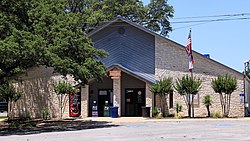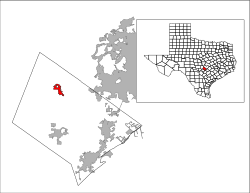Dripping Springs, Texas
 From Wikipedia - Reading time: 10 min
From Wikipedia - Reading time: 10 min
Dripping Springs, Texas | |
|---|---|
 City Hall (2019) | |
| Motto: "Gateway to the Hill Country"[1] | |
 Location of Dripping Springs, Texas | |
 | |
| Coordinates: 30°12′09″N 98°05′07″W / 30.20250°N 98.08528°W | |
| Country | United States |
| State | Texas |
| County | Hays |
| Incorporated | 1981 |
| Area | |
• Total | 8.80 sq mi (22.78 km2) |
| • Land | 8.80 sq mi (22.78 km2) |
| • Water | 0.00 sq mi (0.00 km2) |
| Elevation | 1,168 ft (356 m) |
| Population (2020) | |
• Total | 4,650 |
| • Density | 529/sq mi (204.1/km2) |
| Time zone | UTC-6 (Central (CST)) |
| • Summer (DST) | UTC-5 (CDT) |
| ZIP Code | 78620 |
| Area code | 512 & 737 |
| FIPS code | 48-21424[4] |
| GNIS feature ID | 2410357[3] |
| Website | cityofdrippingsprings.com |
Dripping Springs is a city in Hays County, Texas, United States. The population was 4,650 at the 2020 census. It is part of the Greater Austin metropolitan area.[5]
Geography
[edit]Dripping Springs is in northern Hays County on U.S. Route 290, which leads east 23 miles (37 km) to Austin and west 24 miles (39 km) to Johnson City.
According to the United States Census Bureau, the city has a total area of 3.9 square miles (10.0 km2), all land.[6] Most of the city drains southwest to Onion Creek, an east-flowing tributary of the Colorado River.
The town bills itself as the "Gateway to the Hill Country," referring to the 25-county region known as the Texas Hill Country.
Climate
[edit]The climate in this area is characterized by hot, humid summers and generally mild to cool winters. According to the Köppen climate classification system, Dripping Springs has a humid subtropical climate, Cfa on climate maps.[7]
Demographics
[edit]| Census | Pop. | Note | %± |
|---|---|---|---|
| 1990 | 1,033 | — | |
| 2000 | 1,548 | 49.9% | |
| 2010 | 1,788 | 15.5% | |
| 2020 | 4,650 | 160.1% | |
| U.S. Decennial Census[8] | |||
| Race | Number | Percentage |
|---|---|---|
| White (NH) | 3,346 | 71.96% |
| Black or African American (NH) | 47 | 1.01% |
| Native American or Alaska Native (NH) | 20 | 0.43% |
| Asian (NH) | 54 | 1.16% |
| Pacific Islander (NH) | 4 | 0.09% |
| Some Other Race (NH) | 10 | 0.22% |
| Mixed/Multi-Racial (NH) | 180 | 3.87% |
| Hispanic or Latino | 989 | 21.27% |
| Total | 4,650 |
As of the 2020 United States census, there were 4,650 people, 1,833 households, and 1,278 families residing in the city.
As of the census[11] of 2010, 1,788 people, 662 households, and 455 families resided in the town. The population density was 468.7 inhabitants per square mile (181.0/km2). The 723 housing units averaged 176.8 per square mile (68.3/km2). The racial makeup of the town was 81.50% White, 0.90% African American, 1.30% Native American, 0.10% Asian, 16.2% from other races, and 2.0% from two or more races. Hispanics or Latinos of any race were 29.10% of the population.
Of the 662 households, 23.4% had children under the age of 18 living with them, 52.9% were married couples living together, 11.2% had a female householder with no husband present, and 31.3% were not families. About 26.0% of all households were made up of individuals, and 25.5% had someone living alone who was 65 years of age or older. The average household size was 2.69, and the medium family size was 3.23.
In the town, the population was distributed as 30.3% under the age of 19, 5.6% from 18 to 24, 24.9% from 25 to 44, 26.7% from 45 to 64, and 12.6% who were 65 years of age or older. The median age was 37.8 years. For every 100 females, there were 105.3 males. For every 100 females age 18 and over, there were 103.9 males.
The median income for a household in the town was $55,288, and the median income for a family was $61,875. Males had a median income of $51,307 versus $39,798 for females. The per capita income for the town was $28,482. About 5.7% of families and 10.7% of the population were below the poverty line, including 11.4% of those under age 18 and 5.0% of those age 65 or over.
Economy
[edit]Dripping Springs is part of the Sustainable Places Project, an initiative to help Dripping Springs and other Central Texas cities create livable places that reflect community goals[12] as the cities grow.[13]
An HEB grocery store and Home Depot are located near the junction of U.S. Highway 290 and RR 12.[14] Dripping Springs is also the wedding capital of Texas[15] and a tourist spot.[16] The town and surrounding area is recognized[17] as a brewery, distillery, and winery destination.
In 2014, Dripping Springs began to attract a new breed of tourists when it was named a Dark Sky Community, the first in Texas. The International Dark-Sky Association made the designation in recognition of the town's 2011 lighting ordinance that reduced outdoor lighting to a minimum. On the last weekend of March, Dripping Springs now hosts annual Dark Sky festivals drawing thousands of Astro-tourists.[18]
Education
[edit]The city is served by the Dripping Springs Independent School District.[19][20] The city has one high school, two middle schools, and five elementary schools. The district was reclassified as 6A in 2022. Private schools include Appamada School (K-12), Acton Academy (K-5), and AESA Prep Academy (K-12). The area is also served by the Pinnacle Campus of Austin Community College.[21]
Notable residents
[edit]- Kyle Chandler, actor (Early Edition, Friday Night Lights, Bloodline)
- Cameron Duddy, music video producer and bassist for Midland
- Johnny Gimble, fiddle player and songwriter, who played with Bob Wills and His Texas Playboys[22][23]
- John F. Gregory, optical engineer and designer of the Gregory-Maksutov telescope
- Woody Harrelson, actor
- E. D. Hill, former host of Fox and Friends
- Jesse James, television personality, motorcycle builder, firearm builder
- Roger A. Keats, member of the Illinois Senate from 1979 to 1992. He moved to Dripping Springs in 2013[24][25]
- Ben Kweller, musician
- Pat Mastelotto, musician
- Adam Narkiewicz, a.k.a. 'Akira the Don', hip-hop musician[26]
- Israel Nash (Israel Nash Gripka), singer/songwriter
- Kurt Neumann, lead singer and guitarist of BoDeans
- Dave Pelz, American golf coach and author
- Slim Richey, musician
- Gregg Rolie, founding member of the bands Santana and Journey
- Patrick Rose, lawyer, former state representative, and subject of the documentary Last Man Standing: Politics—Texas Style
- Leonidas Johnson Rountree, newspaper publisher, born here in 1868[27]
- Phillip Sandifer, songwriter, recording artist[28]
References in popular culture
[edit]A fictionalized version of Dripping Springs, TX is the home of DC Comics' character Jinny Hex from the superhero team Young Justice.[29][30]
References
[edit]- ^ "City of Dripping Springs Texas". City of Dripping Springs. Retrieved February 8, 2018.
- ^ "2019 U.S. Gazetteer Files". United States Census Bureau. Retrieved August 7, 2020.
- ^ a b U.S. Geological Survey Geographic Names Information System: Dripping Springs, Texas
- ^ "U.S. Census website". United States Census Bureau. Retrieved January 31, 2008.
- ^ "Census - Geography Profile: Dripping Springs city, Texas". United States Census Bureau. Retrieved April 14, 2022.
- ^ "Geographic Identifiers: 2010 Census Summary File 1 (G001): Dripping Springs city, Texas". American Factfinder. U.S. Census Bureau. Archived from the original on February 13, 2020. Retrieved February 8, 2018.
- ^ "Dripping Springs, Texas Köppen Climate Classification (Weatherbase)". Weatherbase.
- ^ "Census of Population and Housing". Census.gov. Retrieved June 4, 2015.
- ^ "Explore Census Data". data.census.gov. Retrieved May 24, 2022.
- ^ "About the Hispanic Population and its Origin". www.census.gov. Retrieved May 18, 2022.
- ^ "U.S. Census website". United States Census Bureau. October 5, 2010. Retrieved January 12, 2014.
- ^ "Final Plan Presentation 12/10 | Dripping Springs SPP". Drippingsprings.sustainableplacesproject.com. June 13, 2012. Archived from the original on November 27, 2013. Retrieved January 12, 2014.
- ^ Real estate growth trending westward Community Impact. 8 July 2014.
- ^ "Signs of growth springing up - Austin Business Journal". Bizjournals.com. February 15, 2013. Retrieved January 12, 2014.
- ^ Graczyk, Michael (December 4, 2013). "More people, businesses moving to Dripping Springs | kvue.com Austin". Kvue.com. Archived from the original on December 11, 2013. Retrieved January 12, 2014.
- ^ "A foodie's guide to Dripping Springs | Relish Austin". www.austin360.com. August 31, 2013. Retrieved January 26, 2014.
- ^ Drink and dine your way through these Dripping Springs hot spots culturemap Austin. 10 February 2014.
- ^ "Dark Skies over Drippin'". The Attic. Retrieved March 19, 2019.
- ^ "Dripping Springs ISD / Homepage". www.dsisd.txed.net. Archived from the original on March 15, 2015. Retrieved March 22, 2015.
- ^ "Dripping Springs ISD Construction Website - Home". www.dsisdbond.net.
- ^ "Pinnacle Campus - Austin Community College District". www.austincc.edu.
- ^ "Welcome to Johnny Gimble's world of Texas Swing!". Johnnygimble.com. Archived from the original on July 24, 2011. Retrieved January 12, 2014.
- ^ "Biographies". Texasplayboys.net. Archived from the original on April 11, 2002. Retrieved January 12, 2014.
- ^ "Retiring in Texas: Why a Former Illinois State Senator Became a Proud Texan | How Money Walks | How $2 Trillion Moved between the States - A Book By Travis H. Brown". howmoneywalks.com. August 2, 2015. Retrieved June 9, 2018.
- ^ "Former State Sen. Keats Finds a Home in Texas". Scott Holleran. Retrieved June 9, 2018.
- ^ "TEXODUS! We're moving to Texas and we're GOING ON a STREAMING TOUR!".
- ^ "Leonidas Johnson Rountree". Political Graveyard. Retrieved December 27, 2010.
- ^ "Home". Phillipsandifer.com. Retrieved January 12, 2014.
- ^ Nolan, Liam (November 4, 2019). "EXCL: Young Justice #10 Reveals a New Hero's Mysterious Backstory". Comic Book Resources (CBR). Retrieved December 29, 2020.
- ^ Gaines, Kelly (February 11, 2019). "Comics Recap: 2018 New Character Spotlight". DC Comics News. Retrieved December 29, 2020.
 KSF
KSF